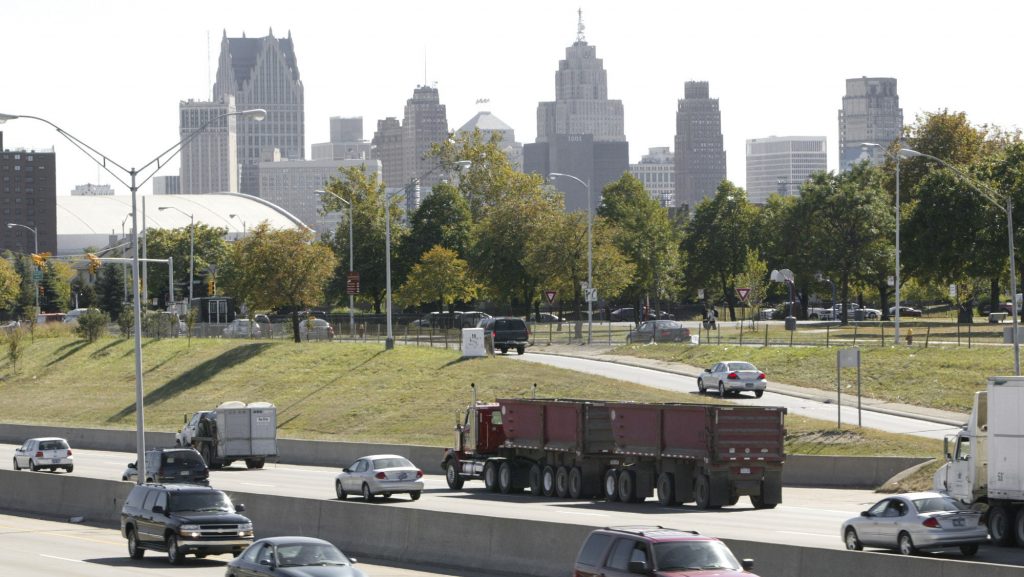The Metro: How Michigan’s insurance reform laws failed to protect Detroit drivers
Anelle Scott July 23, 2024Outlier reporter Koby Levin and Melissa Love, a Detroiter who’s been paying through the nose for auto insurance, both joined the show to discuss loopholes in the state’s reform laws.

FILE- Traffic flows along Interstate 375 near downtown Detroit.
A recent joint investigation by The Markup and Outlier Media found that the average cost of auto insurance in Detroit is $5,300 a year — more than any other big city in the country.
State reforms put in place five years ago were supposed to bring relief by prohibiting insurers from considering certain factors unrelated to driving when setting rates, including ZIP codes, sex, marital status, homeownership, educational level, occupation and credit scores.
However, the investigation shows just how little the reforms did to stop insurers from using where people live to set their rates. To discuss this, Outlier reporter Koby Levin and Melissa Love, a Detroiter who’s been paying through the nose for auto insurance, both joined The Metro.
Subscribe to The Metro on Apple Podcasts, Spotify, NPR.org or wherever you get your podcasts.
Detroit Mayor Mike Duggan was pivotal in helping pass the auto insurance reform law in 2019, hoping that it would save people over $500 per year. But that’s not the case for most Detroiters and Michiganders living in majority Black neighborhoods, partly because loop holes in the law allow insurance companies to still group insurance risk by “geographic territory.”
For that reason, Levin says, the amount you pay for insurance has everything to do with your address. And although insurance companies will say there are many different variables that make these prices higher for Detroit residents, the reporting from Outlier shows customers in majority Black neighborhoods are being charged higher premiums.
“What we’re hearing from the insurers is, well, when we put all these variables into our system, what we come out with is, you know, a rate that’s just higher for Detroit, and we’re sorry about that, but there’s nothing we can do.” Levin said “And we just have to ask, if the effect is that Black communities are paying more, you know, how did we get here?”
Auto insurance averages around $3,200 every six months on the west side of Detroit near the Chadsey Condon neighborhood, W. Grand Blvd and Buchanan which is where Love is from. These prices are more than double what people living in the suburbs are paying, which makes living in Detroit difficult for the average person.
“My experience with car insurance payments have been very hectic, stressful.” Love said. “Especially you know, being a single mother with six children and can barely pay for rent. How can I pay for insurance?”
Additionally, Levin says, most of the lawmakers who are currently representing Detroit were involved in the auto insurance reforms of 2019, leaving residents with little recourse to find a resolution beyond the law.
“If you ban just zip codes, car insurers are still able to find other ways of setting rates based on geography, they can just use a smaller unit or units that are even almost identical to zip codes, but it just called something else, you know what I’m saying?” Levin said. “So it’s a big loophole, and car insurance drove straight through it.”
Use the media player above to hear the full interview with Levin and Love.
More headlines from The Metro on July 22, 2024:
- On Sunday, President Joe Biden announced he will no longer run for reelection. Biden has stepped down as the Democratic nominee and endorsed Vice President Kamala Harris to succeed him. Stephen Henderson, host of WDET’s Created Equal, joins to discuss.
- Mayor Mike Duggan’s Blight to Beauty project aims to improve the appearance of properties throughout the city. Katrina Crawley, assistant director of blight remediation for the City of Detroit General Services Department, joined The Metro to share more about the initiative.
- Belle Isle’s Giant Slide opened last Friday, and that was a big deal for southeast Michiganders. WDET assistant producers Sydney Waelchli and Anelle Scott joined the show to discuss the excitement of the slide’s opening.
Listen to The Metro weekdays from 11 a.m. to noon ET on 101.9 FM and streaming on-demand.
